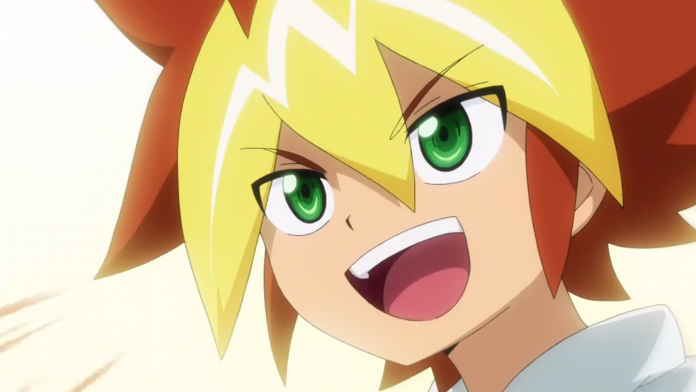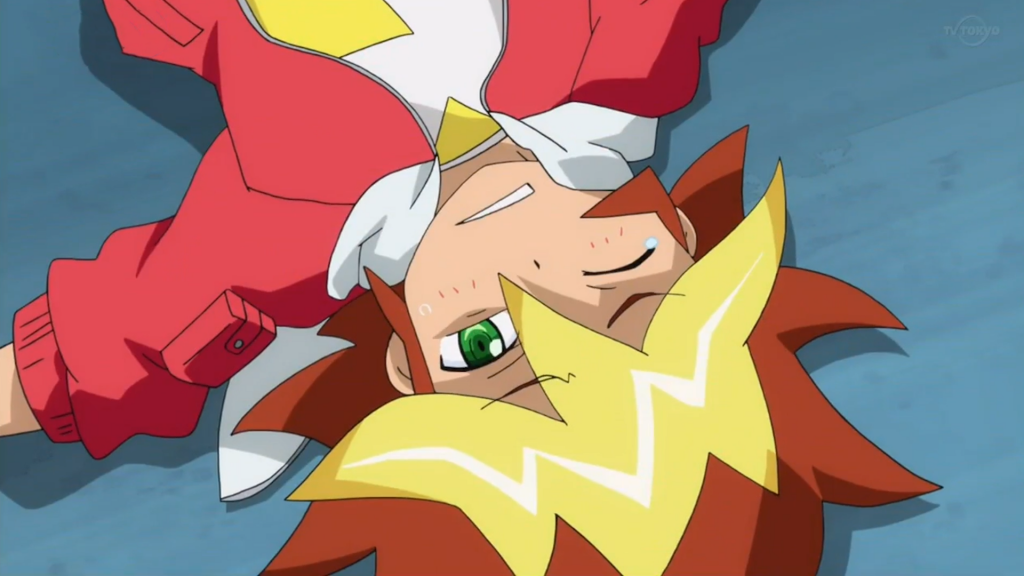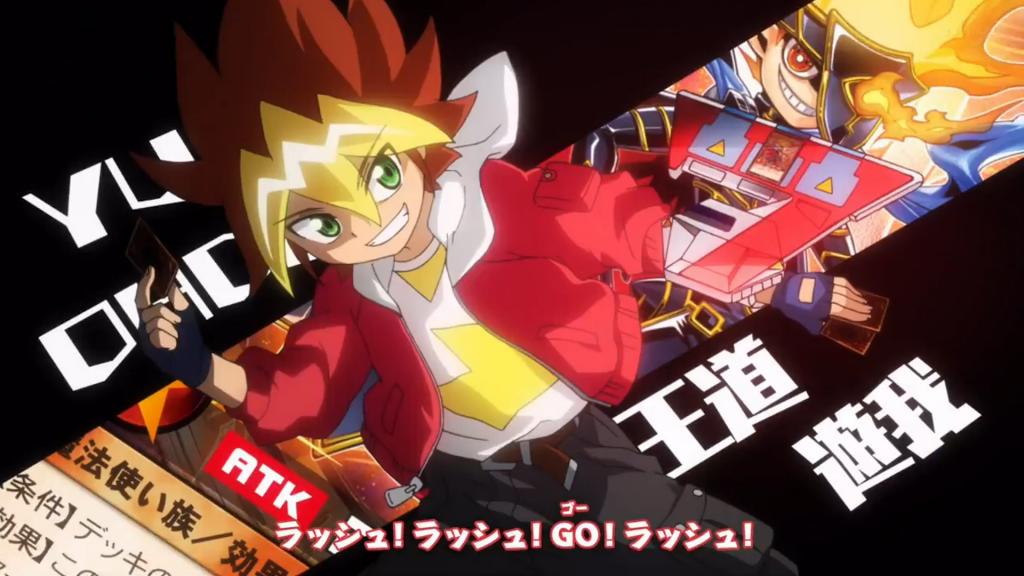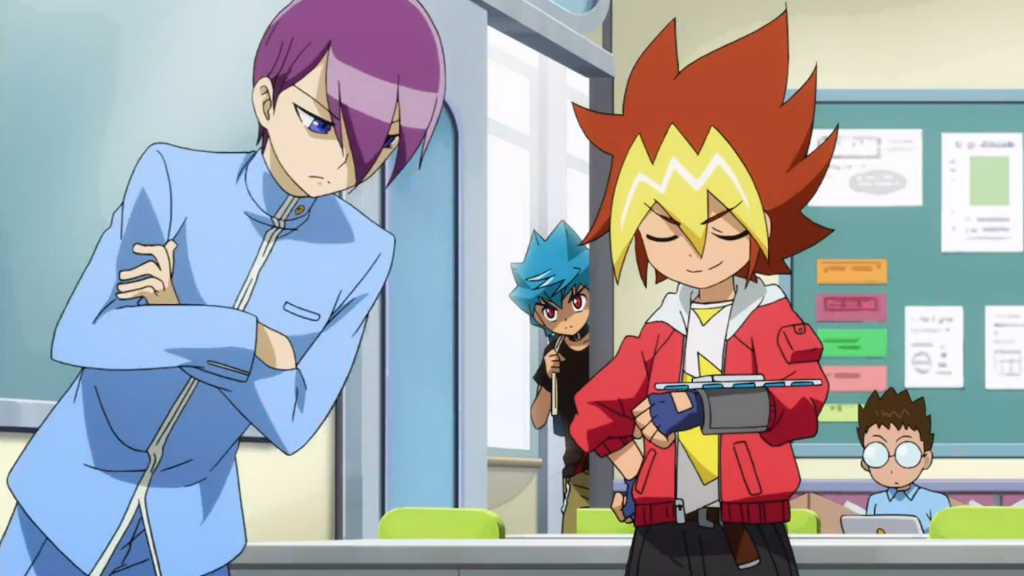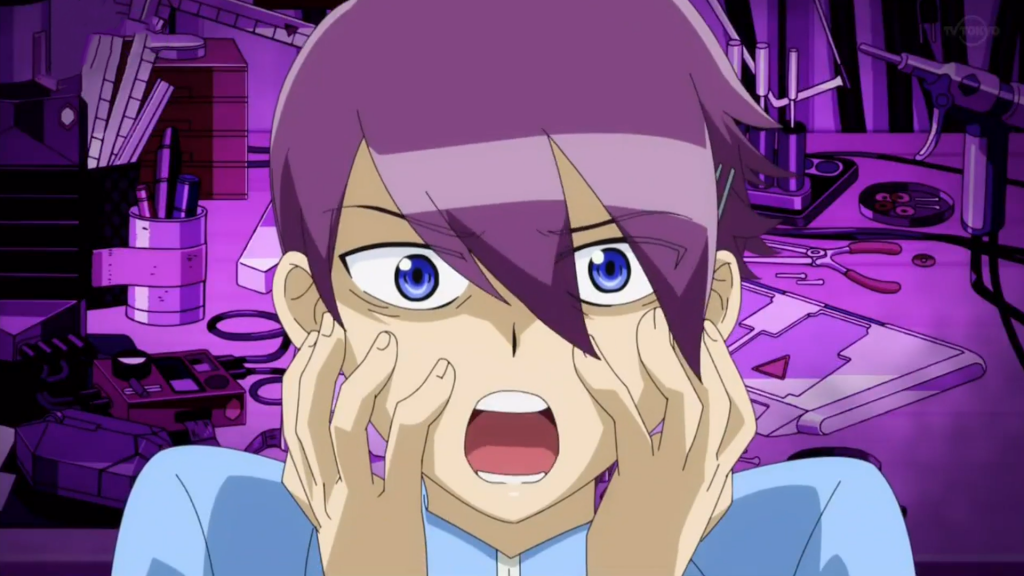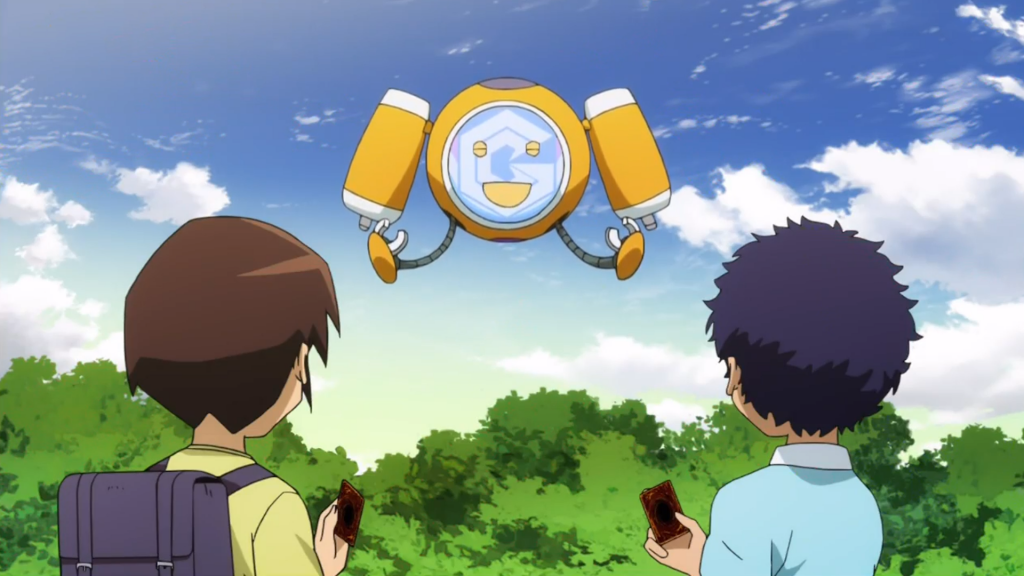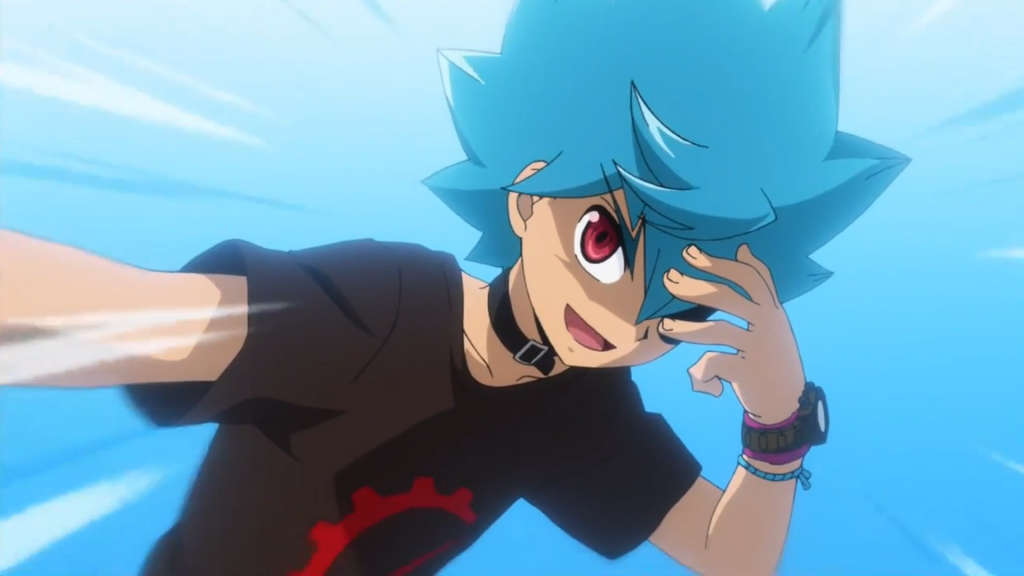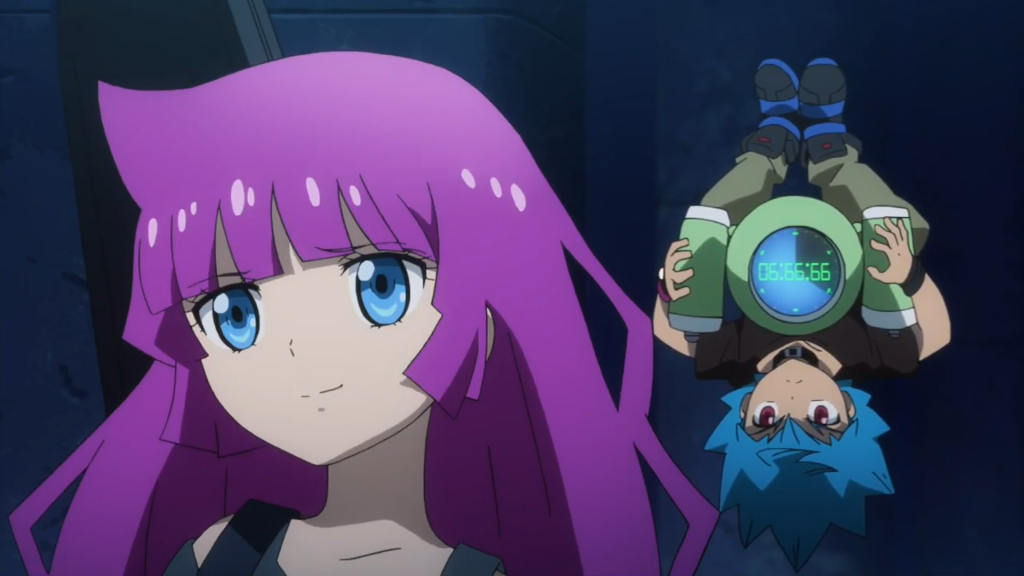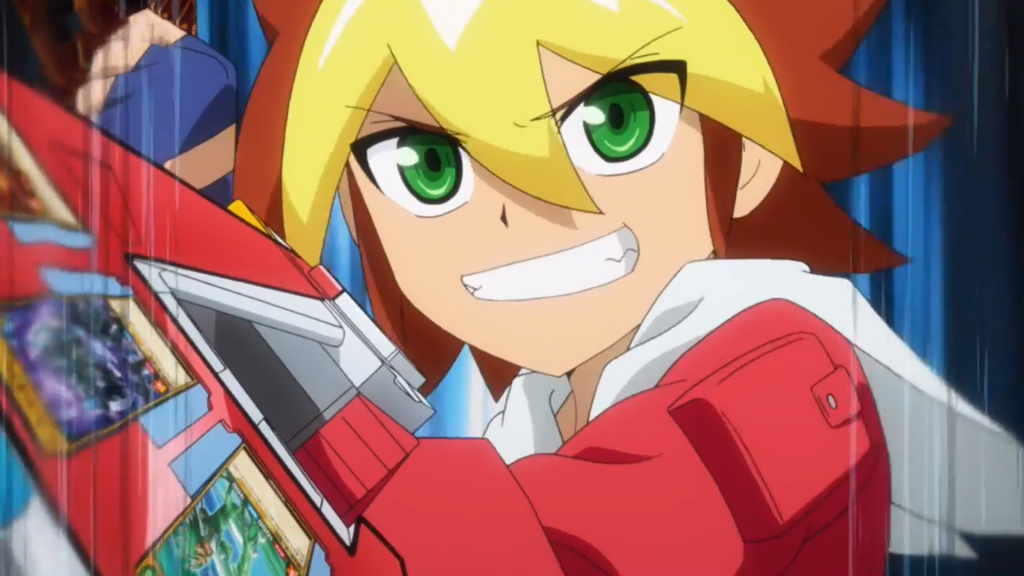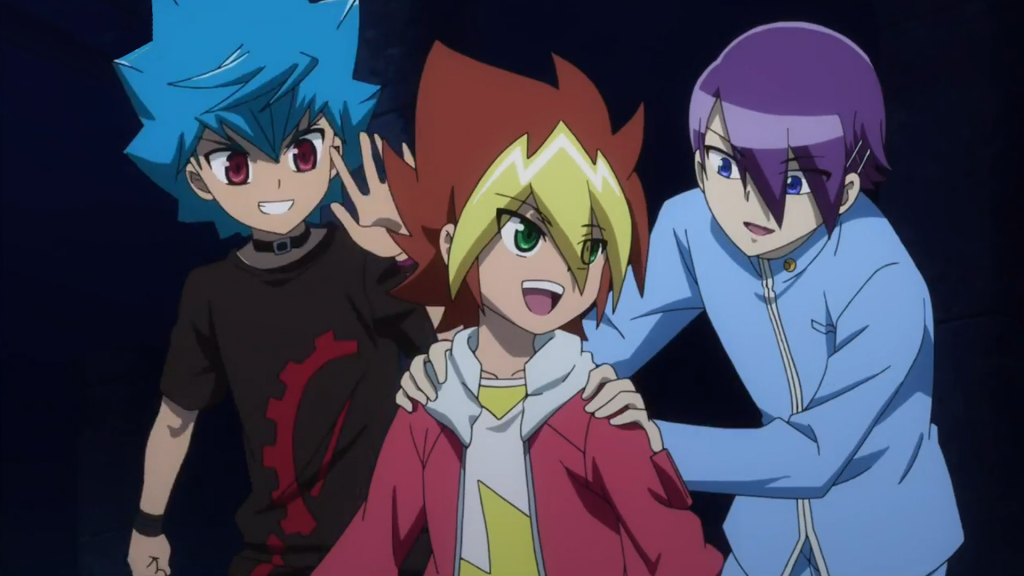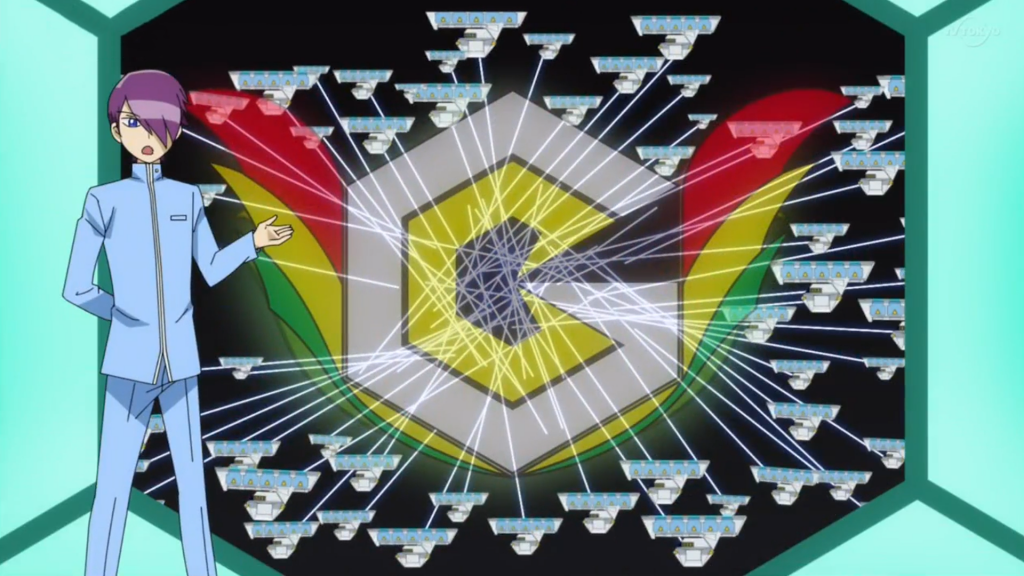Yu-Gi-Oh SEVENS is finally here, and it is completely different from all of its previous shows. With a new, friendly art style, simplified mechanics, and lighter tones, Yu-Gi-Oh SEVENS is very unique to the franchise.
Many existing fans don’t know how to react to the changes. Is that a good thing or a bad thing? I’d say, if you’ve ever thought about getting into Yu-Gi-Oh now is a good time to try. SEVENS is very different, and you definitely shouldn’t think the other shows are similar. It’s goal though is being open to new audiences for the show and the card game.
The Evolution of Yu-Gi-Oh and the New Generation
It’s been 20 years since Duel Monsters first aired and Yu-Gi-Oh exploded into a massive franchise. Now several iterations of the anime have come, and they’re all made primarily to sell the actual card game. Despite that, Yu-Gi-Oh still managed to entertain its viewers and grow a big following.
What attracted many to Yu-Gi-Oh was a mixture of its distinct designs and its incredibly dark stories, as the shows eventually had very serious tones and personal risks for the characters. With grim ancient Egyptian themes, the shows go from friendly card games to deciding the fate of the world. Some villains were only cartoonishly evil, making the show entertaining. But many kidnapped friends and family to force people into dueling them. Reminder: this is all a massive advertisement for a literal children’s card game.
SEVENS is a refresh of the Yu-Gi-Oh Franchise
Although, the franchise hasn’t really been targeted for kids in a long time. While the kids who first got into the franchise in 2000 had grown, so had the franchise. Each show added new card mechanics as well as new card pools. This and implementing the “top-deck combo-god” appeal of the shows into the game made it complicated over time.
Yu-Gi-Oh cards are infamous for having too much text to describe effects despite being recognizable from the show. And the character designs also started to become more complex in its need to stay cool and edgy. Eventually Yu-Gi-Oh became something you had to already be into, as it was too intimidating for outsiders. New kids might’ve still tried them, but after 20 years the shows and game had gone way overboard. So Konami was struggling to gain new fans of the series.
Enter: Yu-Gi-Oh SEVENS, the seventh iteration of the show and a fresh start for a whole new generation. SEVENS features more generic and cheaper character designs that give the entire show a different vibe from it’s previous designs. This resulted from changing studios, cutting animation costs, the Yu-Gi-Oh style being insanely difficult to replicate, and, most of all, appealing to their target audience of the upcoming generation.
In fact, all aspects of this show have that last point in mind. Yuga is eleven, the youngest protagonist in the franchise. The main cast are all in the fifth grade. The tones are much more lighthearted. And even some voice actors are actual 15-year-old kids.
Rush Duels are a fast-paced breath of fresh air
SEVENS introduces an entirely new game format called Rush Duels. Rush Duels aim to make matches more exciting and quicker. There’s only three card slots of each type for the new board. Normal summons per turn are now unlimited. Card effects only activate once a turn (stopping crazy chain combos). And you draw up to five cards during the draw phase. So use everything you’ve got to make use of the hand refresh. If you play the physical game, you also need cards specifically marked for Rush Duels. The plan with Rush Duels is fairly obvious, especially with Konami’s growing reach in the mobile market. They want an audience of kids with a new series and a format that’s easy to make a mobile game.
Naturally, some see Yu-Gi-Oh SEVENS’ direction, and especially the character designs, as a sin to the franchise. But I see it as a way to take a step back and try something new. There’s a lot of potential for a show like SEVENS since they aren’t limiting themselves to selling Yu-Gi-Oh to existing hardcore fans. I’m sad to see the old style go, as I grew up with it and worship characters like Seto Kaiba. But I’m interested in seeing where the series is going. I’m not saying the series will definitely be great, just that they have room to try new things. I might like those things and so might you.
Breaking down Yu-Gi-Oh SEVENS episode one
The first episode of SEVENS aired and is fansubbed already. Though you likely won’t find the show licensed for a while. Crunchyroll used to license and simulcast the previous Yu-Gi-Oh iterations, but SEVENS isn’t there yet. They’re either delaying the show or it’s going somewhere else entirely.
Though Crunchyroll is hosting the new Shadowverse anime this season, which is another popular card game, and I wonder if that’s factoring into why SEVENS isn’t there. Maybe it has to do with COVID-19 and delaying the show until card production and shipments can safely continue. I’m not sure what’s going on with that, but I was still able to find and watch it. So now I’m going to break down the entire first episode of Yu-Gi-Oh SEVENS.
It starts with a short flash-forward in which we see our 11-year-old fiery-haired protagonist, Yuga Oudou, piloting a dueling mecha with crowds of people riding its legs to cheer him on. We see the mecha sprint through the cityscape and run towards a spire wherein the mystery antagonist awaits. The narrator tells us that this is the story of how Yuga will bring freedom to this world. Only, before Yuga can confront the villain, Yuga wakes up and realizes it was just a dream.
The new opening is like a casino
Then we cue the opening sequence, with colorful, slice-of-life sequences that mix with it’s new casino-vibe song. By the way, they named the theme for SEVENS “Nanananananana”. The joke is it’s “na” seven times and because the Japanese word for seven is “nana”. This is, of course, the first of many times the number seven shows up.
The pilot opens with Yuga hacking into his duel disk. Meanwhile, a nearby floating robot loudly declares that it’s detected the hacking and gives Yuga a 6 minute and 66 seconds warning to stop or he’ll be penalized.
I’m not sure why they decided on that time, nor do I know why they don’t just call it 7 minutes and 6 seconds, since that’s what that time actually amounts to. It’s likely some on-the-nose symbolism that the people running the duel network are evil, as 666 is typically used to refer to the Devil. This trend of 6s being associated with this corporation continues when Yuga fails to finish his hacking and receives a penalty. His fifth penalty, actually, and if he receives a sixth his account will be banned.
Yu-Gi-Oh SEVENS – Freedom vs Structure
The next morning, Yuga yawns as cheerful music plays and he rides his bike to Goha 7th Elementary School. Another floating robot in the area smiles and greets the students before detecting Yuga’s bike and lecturing him that it seems to be modified. As you can tell by now, these robots are strict despite their friendly voice and expressions. These two altercations with robots goes into the show’s main theme of breaking away from traditional rules to try something different.
After other students discover Yuga now has five penalties, as it’s always visible on your duel disk, we meet another member of the main cast: Gakuto Sougetsu, the student council president. Gakuto is a purple-haired strict, “by the book” guy that wears formal school uniform attire and continuously lectures Yuga for his constant disregard of the rules. First he questions the bike, and Yuga explains that it’s his “duel bicycle” which made me immediately have war flashbacks to Yu-Gi-Oh 5D’s (god no please not again NOT THE BIKES-).
Then we get a quick side-view of Romin Kirishima, a magenta-haired guitarist who’s a member of the school band. We don’t get to know her too much from this episode, but we can tell from the opening and her gimmick that her deck is musically-themed. From what we find out later, Romin claims she isn’t interested in dueling and really only cares about her guitar. But there’s a shot in the opening of her crying, so don’t think she’ll just be a cheerleader without a story.
Yuga’s road is the path to freedom
Gakuto continues lecturing Yuga, screaming when he hears Yuga is trying to hack his duel disk, and then formally explains to the viewers about the duel network and penalty system. In the lecture, he also explains that the duel disks are completely controlled by the Goha Corporation, so attempting to modify them and accumulating 6 penalties will result in a system-wide ban.
Yuga explains that he was trying to install new rules into his duel disk. He proudly shouts his catchphrase, “My Road”, proclaiming that he wants to play the game his own way. Which is entirely what this show is all about, telling viewers that they should have fun and live their life in whatever way makes them happiest.
Yuga’s goal is to install his Rush Duel rules onto his duel disk to show the world that it’s become too dry and strict. The conversation gets shut down when the school bell rings and another robot flies in, automatically locks everyone’s duel disks, and begins to teach the class.
Here, we also see a quick glimpse of the blue-haired last of the main cast, Tatsuhisa Kamijou. He’s clearly the dragon deck in the group, as apparent by his bad boy appearance, his “blue-eyes white dragon” colored hair, the way he spies on our protagonist from a distance, and the fact that we clearly see him and a new blue dragon card in the opening. Alright, only that last point makes it clear. More on him later.
Oppression through card games
We then cut to the end of the school day, where we see two students attempting to trade cards with each other before a robot comes out and lectures them. Saying “Trading cards personally through individuals is prohibited” and that they need to trade “under the supervision of the Goha Corporation”.
If you haven’t guessed by now, the world they inhabit is run by a massive corporate conglomerate, the Goha Corporation. They control the robots that monitor the cities and penalize people. They own and run the schools, where they likely indoctrinate the kids for future control by the corporation.
Hell, why stop there, they own the company metropolis they live in. Yeah, their city is called Goha City and they run everything from daily necessities to shelter. And, of course, they control the dueling network, which looks like it was once integral to the unifying and connection of the world but now it’s being heavily used by Goha to maintain their power.
The world of SEVENS is darker than you think
Many Yu-Gi-Oh fans were worried about SEVENS early on when they saw the preview of the opening. These concerns were mostly from a design perspective but they also had problems with it tonally, as SEVENS seemed much more lighthearted than Yu-Gi-Oh has ever been.
While it might seem like it at a glance, and this first episode isn’t very cynical of its world, it’s clearly laying out the groundwork for a more serious story. The way that the show subtly tells you that Goha controls everything and is the villain without ever showing any comically evil antagonists or saying that Goha needs to be stopped is really interesting to me.
Continuing, after Yuga bikes past the students from the last scene we transition into his first interaction with Tatsuhisa, who proclaims himself as the school’s number one duelist. He tells Yuga that he can call him “Rook”, likely a reference to his name’s kanji meaning “castle”. “Rook” has usually been localized in English online as “Luke” so that’s what I’ll call him too.
Anyways, he stops Yuga and asks if they can talk, but when Yuga tries to drive past him Luke touches his bike and it sparks before stopping. This reveals that he can somehow send a small electric shock from his hands to short out technology.
The bad-boy & the ancient prophecy
Luke tells Yuga that he believes his new rules for the game are likely the path to unlocking a mystery he’s been trying to solve. The mystery being an ancient prophecy which will reveal the world’s King of Games, a common element of Yu-Gi-Oh shows. So a curious Yuga follows him to an underground place as Luke explains that a Goha engineer at one point secretly installed a backdoor in the duel system, and whoever could unlock this door would become the King of Duels.
When they arrive, a hologram appears and states that he will test if a challenger is worthy of being the King of Duels. Luke had discovered the program a week ago and had been trying to solve the puzzle, but he discovered that even if you duel it and win, that wasn’t the answer. And whether you win or lose, you receive a penalty on your duel disk.
In fact, Luke reveals he’s already banned from dueling as a result. But when he heard Yuga talk about his Rush Duel system, he theorized that Yuga’s “road” could be the key to solving the puzzle. Meaning that the answer isn’t just to play the game, but to play it your own way.
Risking it all for Rush Duels
So they decide to have Yuga risk his final penalty on this dueling puzzle by first attempting to successfully hack into his duel disk. As he’s working on that, Gakuto notices Yuga’s bike and comes in to yell at him for not coming to the student council office after school. Of course he freaks out when he sees the hologram and finds Yuga attempting to hack his duel disk again.
Then a nearby robot flies in crying about the hacking attempt and starting a timer, threatening to penalize everyone present. Through all this, Luke calls out Romin, who was hiding in the room. She comes out and suspiciously says she was just practicing guitar on the top floor and isn’t interested in dueling. Then, to delay the robot, Luke uses his electricity to short out the robot and stop the timer.
Quickly after, a loud chime marks the completion of Yuga’s hacking and the hologram’s floor raises to reveal an ancient door as the hologram declares that his rightful challenger is “finally here”. The cast cheers until Luke reminds them that the installation isn’t complete yet, as Yuga only hacked into it but hasn’t set it up for Rush Duels yet. That’s when they also notice his duel disk’s battery is dying.
Hacking and “screw the rules”
Fearing a potential penalty as if it were his own life on the line, Gakuto runs outside to grab Yuga’s bike and begins using it to generate electricity for the duel disk. This works, but at around the same time the warning robot comes back to life, and Luke finds out he only has the power to shock twice a day (a power which has only been explained by Luke as some kind of demon living inside him).
When they realize they don’t have time to manually install the rules for Rush Duels first, Yuga decides to use what’s called, and I kid you not, “real-time duel programming”. With which he can, as the name implies, program the rules of their duel in real-time as they play.
Yeah, you remember all the parts with the original show just constantly ignoring the rules to make the duels more entertaining? To the point where Yu-Gi-Oh Abridged used Kaiba to coin the phrase “screw the rules, I have money”? SEVENS literally made it so that they can do whatever they want with their games if they want to. Which works with the themes of the show, but it’s funny to think that “screw the rules” is a canon mindset in the anime now.
Real-time duel programming is kind of dumb
In fact, real-time duel programming is immediately confirmed to be how the developers of the game apply updates. This doesn’t make sense at all, and definitely wouldn’t be the smartest method. Sure, it helps with testing the game, and making quick adjustments, but you’d still have to verify this manually. As every other element of the rules you just arbitrarily implemented are likely very unbalanced. We’re not even talking about bug fixes or quick-tweaks to a platformer. We’re talking about literal balance patches for an entire trading card game.
Game adjustments usually aren’t just made and then immediately sent out into the world. Even if they’re automatically tested for bugs, you’d still want it all play-tested by actual QA people. This is to make sure you didn’t accidentally break the game with a new combo. Let’s say we assume Goha’s tech is so advanced that they can instantly run simulations to prove it’s balance. It would need to solve the game, make heavy automatic balance changes, and then test the game after that. I know I’m thinking too much about a kid’s show promoting a card game, but my computer science brain broke.
The first rush duel of Yu-Gi-Oh SEVENS
With the cast here, the risks at stake, and the ancient door, the stage is set for the Rush Duel. The match starts with Yuga’s duel disk transforming from its 5-card slot to a shorter 3-card slot. The new shape, of course, looks like a large number seven attached to his arm. They each start with four cards and Yuga draws as he goes first. He then immediately throws down three monsters from his hand.
I know I explained Rush Duels earlier, and the point of the show being to just have your own fun. But when I saw this I burst out laughing. Because, of all the ways to say “screw the rules”, I think this was amazing. Filling your entire board on the first turn with no gimmicks is just the perfect way to do it.
It feels like that one kid you used to have lightsaber fights with. You’d clearly beat them but they’d keeps saying “Nuh-uh, you didn’t hit me! Nuh-uhh!!” And eventually you stopped talking to them because you realized how annoying they were. (That kid probably works at the grocery store now).
Has Yuga lost already? Of course not!
Yuga can’t attack on the first turn so he sets his last two cards face-down. This empties his hand, and ends his turn. When the hologram accepts this programming, it normal summons two monsters then tribute summons the iconic Blue-Eyes White Dragon. Because of course you were gonna see a Blue-Eyes and of course it was coming out on the first turn.
He then uses a spell card that destroys all of Yuga’s monsters and has his Blue-Eyes attack him directly. Worried Yuga lost already because Rush Duel probably also means less lifepoints? Well worry not! Because yes, Rush Duel uses less, but of course it uses 4000 lifepoints. Yuga is now only 1000 shy of losing.
Yuga dramatically lays on the ground after the holographic attack from the Blue-Eyes White Dragon. A concerned Gakuto runs up and realizes that Yuga has no cards in his hand. He comically cries out as he believes there’s no way Yuga can win now. And he knows he’ll receive a penalty. But Yuga just confidently sits up and smiles as he reminds everyone of the fun of Rush Duels.
The fun of Rush Duels!
After he leaps up, he starts his turn by immediately drawing 5 cards. Now, I’m not saying this is totally the problem with real-time duel programming. Programming that lets you change the rules if things aren’t going your way. I’m just saying, keep in mind the lightsaber kid and tell me you don’t see it.
We check the timer to remind viewers that it’s only been four minutes. Then Yuga summons two monsters, uses an effect to draw, and tribute summons his ace monster: Sevens Road Magician. (I’m not a huge fan of Sevens Road, at least in its CGI form). Then he uses a combination of spells to selectively discard cards and power up Sevens Road. It’s more powerful than the Blue-Eyes, but Yuga’s not done yet.
He then reveals that Sevens Road’s effect makes his attack grow with each different attribute monster in his graveyard. Sevens Road will be at 6700 attack, and the effect is activates by discarding the top card in his deck. All he needs now is to top-deck the missing attribute.
Win the duel, change the rules
And of course he does, bringing Sevens Road Magician’s attack up to, you guessed it, 7000 points. Beating the Blue-Eyes and directly hitting the hologram for exactly all of his 4000 lifepoints. The game is over in two turns and less than 6 minutes and 66 seconds, as natural with Rush Duels.
With the hologram defeated, a message appears telling the gang that the rules for Rush Duels have been successfully installed. The ancient door appears again and opens, shining a beam of light onto Yuga, the next prophesied King of Duels. Followed swiftly by clearing all of Yuga and Luke’s penalties.
And then, to end the show, everyone’s duel disk turned into a seven. Yep, that’s right, everyone has to play Rush Duels now. Not just Yuga and the gang, but the entire world. Remember the point being that everyone should play how they want? I guess not. Guess I’ll die. All that matters is everyone playing Rush Duels. I’m sure that’ll be refreshing for a world that’s been stuck with the same game for years, but I mean there’s definitely people who liked how dueling was before. Like Gakuto, someone extremely rule-oriented who likely believes the the original game was like that for a reason.
Konami’s purpose with SEVENS?
I don’t know, maybe Konami does have nefarious plans with SEVENS. The casino-esque opening song and slot machine-like seven shape of the duel disk might be some kind of subtle way to get kids into gambling. I mean you already have to gamble in the the card and mobile games just to build your collection. And of course Konami is already huge in the slot machine and gacha game industry. But I’d like to think even, if Konami is doing this, at least the animation studio seems to be trying its best to make it entertaining and building its world and story with passion.
In fact, I almost wonder if the Goha Corporation is actually supposed to be a symbolic message about Konami itself. It’s no surprise that, despite many popular franchises coming from Konami, there’s a lot of skepticism and hatred online towards their business practices.
Is the world of Yu-Gi-Oh SEVENS actually supposed to be a dystopian future in which Konami’s influence has spread from games to total global control? That would be hilarious to me if it’s true.
Yu-Gi-Oh SEVENS is a fun time!
Anyways, the first episode of Yu-Gi-Oh SEVENS turned out to be an incredibly interesting experience and I can’t wait to see what more comes of it. Despite my nitpicks and problems with it, it’s these hypocritical problems that usually makes Yu-Gi-Oh just a fun time all around.
Will SEVENS grow into a story that proves Yu-Gi-Oh can look and feel different while still intriguing both new and existing fans of the franchise? That remains to be seen. But I know I’m enjoying it so far, and I hope you’ll give it a try too.


